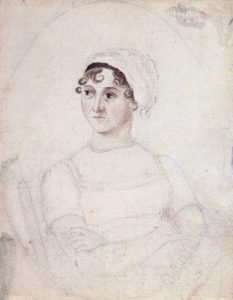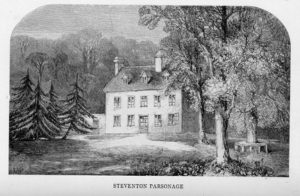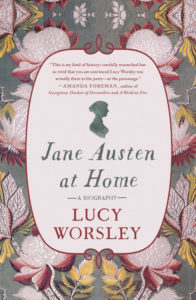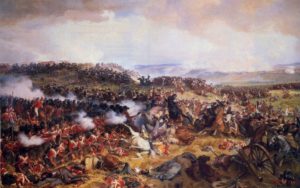by Lucy Worsley
‘What calm lives they had . . .
No worries about the French Revolution,
or the crushing struggles of the Napoleonic wars.’
Winston Churchill on Pride and Prejudice
Jane Austen never went to France. In her lifetime, the furthest north she traveled was Staffordshire; she possibly went as far west as Wales, and definitely to Ramsgate in easternmost Kent. Critics used to comment, often, that she couldn’t be a ‘serious’ novelist because she didn’t write about the French Revolution, Napoleon, or the great events of her lifetime. France itself is only mentioned three times in all her novels.
But in reality nothing could be further from the truth. Jane and her family simply couldn’t disentangle themselves from the country just across the Channel from Hampshire, and particularly from the effects of its French Revolution. It would be Jane’s unique contribution to illustrate the effect of these seismic events indirectly, as they played out in the tiny details of the day-to-day life of ordinary people. She made the political into the personal.

Despite her knowledge of their language, and her admiration of Eliza’s glamour, Jane is ambivalent about the French. You can even identify a subtle thread of anti-French feeling running through her novels. There is the nasty Mr. Hurst in Pride and Prejudice, who likes French cookery, and the slippery Frank Churchill in Emma, who sprinkles his conversation with words like ‘naïveté’ or ‘outrée’. Mr Knightley condemns Frank, and the French, with a damning use of French of his own: Frank, he says, ‘can be amiable only in French, not in English. He may be very “amiable”, have very good manners, and be very agreeable; but he can have no English delicacy towards the feelings of other people.’ In Jane’s novels, the French, and Frenchness, do not come off well. But she’s far too subtle to condemn them out of hand.
Of course even before the Napoleonic Wars began, the French and English nations had long been at odds. Jane’s favourite novelist Frances Burney surprised even herself by her decision to marry ‘a French man’. ‘No wonder upon Earth’, she wrote, ‘can ever arrive near my own in having found such a Character from that Nation.’
But the Austens felt themselves to be above casual racism. Jane knew all about Burney’s marriage, and mentioned it in Northanger Abbey when she had a notably stupid character refer to Burney as ‘that woman they made such a fuss about, she who married the French emigrant’. As James wrote, it was ‘inconsistent with the liberality of the human mind’ to laugh at the French ‘Monseers’ as lousy devils eating ‘fricasseed frogs’.
In 1789 many Britons had indeed welcomed the news of the storming of the Bastille and the end of the absolute French monarchy. ‘How much the greatest Event it is that has ever happened in the World!’ gasped Charles James Fox. But within a year, doubt had set in as the consequences became clearer. How would the gentlemen of Britain, asked Edmund Burke in the House of Commons, like to have their own ‘mansions pulled down and pillaged, their persons abused, insulted, and destroyed; their title deeds brought out and burned before their faces, and themselves driven to seek refuge in every nation throughout Europe’?
As the poet Anna Seward put it, once she’d decided that her own earlier enthusiasm for the French Revolution was mistaken, ‘O, that the French had possessed the wisdom of knowing Where To Stop.’

Jane was thirteen in 1789, and like everyone of her generation her life was shaped by the Napoleonic Wars to follow. She was, in fact, through Eliza, and her sailor brothers, even more closely connected to them than many. Buried beneath the surface of her novels are strong currents of feeling aroused exactly by this question of knowing Where To Stop. ‘
The welfare of every Nation’, states a wise character in Jane’s early story ‘Catharine’, ‘depends upon the virtue of its individuals’, and to offend against ‘decorum and propriety’ is to hasten a kingdom’s ruin. In one sense, Jane’s novels are a bulwark against tumultuous change. In another, they deal with a far more important question than who would win the Napoleonic Wars. They’re concerned with how to live life well in the peace to follow, which was what the fighting was actually for in the first place.
After her flirtatious Christmases at Steventon Rectory, Eliza had returned to France and her husband, only to be forced once again to leave. On 7 July 1789, just in the nick of time to escape the devastation in Paris, the Hancock family arrived in London. On 14 July, the storming of the Bastille began.
The next key event took place on 26 January 1793, when the French killed their king, Louis XVI. According to another country parson, poor Louis had been ‘inhumanly & unjustly beheaded on Monday last by his cruel, blood-thirsty Subjects. Dreadful times I am afraid are approaching’. Mr Austen probably took just the same view. For the British, despite their support for liberty, this was going too far. A month later, they declared war on the French.
 War would soon affect life at Steventon. The various Napoleonic wars began properly when Jane was seventeen, and did not end until she was thirty-nine. This meant that in total she only experienced thirteen years of peace out of the forty-one she lived. It also meant that she had the misfortune to come to maturity in a general drought of marriageable men, as the Napoleonic Wars would see military casualties at an average of 20,000 a year.
War would soon affect life at Steventon. The various Napoleonic wars began properly when Jane was seventeen, and did not end until she was thirty-nine. This meant that in total she only experienced thirteen years of peace out of the forty-one she lived. It also meant that she had the misfortune to come to maturity in a general drought of marriageable men, as the Napoleonic Wars would see military casualties at an average of 20,000 a year.
‘War has not only been declared,’ declaimed Pitt in the House of Commons, ‘it is at our very door.’ Because the county included the vulnerable Channel coast and the dockyard at Portsmouth, Jane’s Hampshire became a kind of Home Front. It bristled with soldiers and sailors, while the county’s roads brought them their supplies. In Winchester, the royal palace left incomplete by King Charles II became home to thousands of captured French prisoners, who were punished for misdemeanors in their prison’s ‘Dark Hole’.
There were 6,000 troops stationed in Winchester too, with 8,000 more in camps near Andover and Basingstoke. ‘Nothing was heard’, wrote one memoirist of this time, ‘but the dread of Buonaparte, and the French invasion. Beacons, Martello towers, camps, depots, and several species of self-defense alone occupied all minds.’
Jane observed all of this. Obviously the officers make a huge impact on the lives of the Bennets in Pride and Prejudice, but not only socially. They bring the violence of the battlefield home to the village, just as Kitty and Lydia bring home the gossip: ‘several of the officers dined lately with their uncle, a private had been flogged, and it had actually been hinted that Colonel Forster was going to be married’. The casual slipping-in of the flogging, as if it were just part of normal life, doubles the insensitivity of these silly girls.
The most immediate impact of the Napoleonic Wars upon the Austen family came when Henry Austen decided to enlist. Republican France declared war on 1 February 1793, and Henry responded two months later by becoming a lieutenant in the Oxfordshire Militia. ‘The political circumstances of the times 1793’, he explained later, called upon ‘every one not otherwise employed to offer his services in the general defence of the Country’.
Henry would now serve for five years as a militiaman. All over the nation other young men were doing the same sort of thing, servants as well as masters. ‘Our Boy Tim Tooley,’ recorded a Norfolk parson, ‘supposed to have been gone to bed was not to be found . . . it is thought he is gone to Norwich to enlist himself, as his Head has long run on a Soldiers Life.’

After only three months he was discharged as ‘insane’. It is noticeable, though, that like Lieutenant Wickham in Pride and Prejudice, Henry signed up to the militia, which was a defensive force, rather than seeking active service overseas. His martial ardor was tempered by a love of home comforts. He also managed, through sickness and leave, to miss the most exciting events that befell his regiment (a mutiny, a riot), although he was present for a shipwreck.
In 1798 Britain joined a new coalition against Napoleon, and Mr Austen went off to a meeting in Basingstoke Town Hall to discuss the Defense of the Realm Act, intended to prepare the country for fighting in the Napoleonic Wars. Across England, surveys were undertaken, and people were asked the question ‘would you be willing to serve?’
This prompted answers of ‘yes’ and ‘no’, but also more colorful responses such as ‘I will give Boneypart a mungle turn’ and ‘I will crip the wings off the French frog eaters.’ These returns showed that Steventon was able to muster a Dad’s Army of thirty-nine capable men between the ages of fifteen and sixty. They didn’t have any proper weapons such as swords, pistols or pikes, but the ‘Implements they can bring’ included sixteen axes, twelve spades and four shovels.
LUCY WORSLEY is a historian, author, curator and television presenter. Lucy read Ancient and Modern History at New College, Oxford and worked for English Heritage before becoming Chief Curator of Historic Royal Palaces. She also presents history programs for the BBC and is the author of several bestselling books, including Courtiers: the Secret History of the Georgian Court, Cavalier: The Story of a 17th Century Playboy, and more. She lives in London, England.
